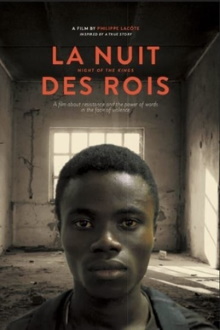I’ve never have thought that the Ivory Coast but this film by director Philippe Lacôte is truly remarkable. Not only does it effectively showcase some of his people’s culture, it throws a bit about the country’s political turmoil and references some of the most ancient traditions of storytelling. All this plus it’s such a gorgeous film to boot! I’m not sure that the plot makes much sense and this certainly is in no way a real prison but that doesn’t matter at all as the film draws us into a world of its own that runs on its own rules.
A young prisoner arrives at the MACA Prison and dismayed to find that it is mostly run by the prisoners themselves with the guards being mostly hands-off. The Dangôro, or king of the prison, is Blackbeard but he is sick and dying. The head of a rival faction, Lass, pressures him to adhere to their tradition that leaders too sick to rule must cede power and commit suicide. Seeking to buy time for himself, Blackbeard immediately names the new prisoner as their Roman. As a red moon rises outside the prison, the Roman must entertain the prisoners with stories. While the storytelling continues, Blackbeard too is granted a reprieve. The new Roman, who is not even given a chance to tell his real name, is bewildered but quickly takes to the role. He spins a story about the life of Zaman King, a famous gangster who he has known since childhood. A veteran prisoner secretly warns him that he will be killed if he completes his story before the sun rises and so he does his best to embellish his tale and draw it out.
So the parallels with Scheherazade are obvious but the film goes much further than that. As Roman tells his story, the other prisoners act out the scenes as seemingly impromptu skits and accompany them with songs as a kind of Greek chorus. His story itself is in the bardic tradition, singing the accomplishments of a folk hero and elements such as the red moon and the ailing leader needing to make way for a new one are familiar ones as well. The content of the story Roman isn’t actually that important, nor is the wider plot. As the other prisoners eventually realize, his story isn’t always consistent and his timeline is all wrong. But that doesn’t matter as it is wonderfully entertaining, incorporating at once the story of a successful bandit king, a hint of the violent politics of the country and even going back in time to when the land was ruled by kings and queens and magic was perhaps real. In this way the film dives deep into the culture of the Ivory Coast and achieves a kind of authenticity that transcends physical reality.
The film is truly gorgeous with carefully considered color composition that takes into account the dark skin tones of all of the actors in it. Watching this is convincing evidence that non-Africans may just not know how to show off black skin tones to best effect. The interior of the prison should look awful and decrepit, and yet the film fills it with energy and life. The magical battle between the rival rulers set in ancient times might have looked cheesy in lesser hands but as with Tsui Hark’s Green Snake strives for a metaphorical interpretation rather than a literal one. While the MACA prison isn’t real and the story of Zaman King doesn’t directly reference any one specific person, there’s enough underlying truth in the stories to make them representative of the Ivory Coast. Make no mistake, even with all of the song and dance, this is a brutal film in which multiple people are killed in very gory ways and it portrays a grim picture of the country as a whole.
Even if things don’t look good for the country, it is heartening to see that it can boast of talented artistes capable of making a film like this. The woman who plays the ancient queen for example is a cameo by Laetitia Ky, whose sculptures with hair you might have seen pictures of on the Internet. This is world-class cinema and watching it is a fantastic visual-audio experience.
